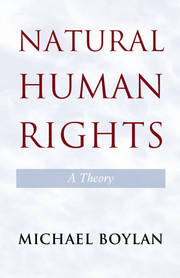Book contents
- Frontmatter
- Dedication
- Contents
- Preface
- Acknowledgments
- Part One Conceptualizing Human Rights
- Part Two Justifications for Human Rights
- Part Three Applications of Human Rights
- Scherzo
- 8 War Rape
- 9 Political Speech
- 10 LGBT Rights
- Rondo“The Game”
- Afterword: The Politics of Change
- Glossary
- Bibliography
- Index
- References
9 - Political Speech
Published online by Cambridge University Press: 05 September 2014
- Frontmatter
- Dedication
- Contents
- Preface
- Acknowledgments
- Part One Conceptualizing Human Rights
- Part Two Justifications for Human Rights
- Part Three Applications of Human Rights
- Scherzo
- 8 War Rape
- 9 Political Speech
- 10 LGBT Rights
- Rondo“The Game”
- Afterword: The Politics of Change
- Glossary
- Bibliography
- Index
- References
Summary
Freedom of speech – especially political speech – is not widely allowed around the world. On the table of embeddedness it constitutes a level-two basic good. This chapter first briefly examines the problem and then applies the natural human rights theory that I have presented to suggest worldview alteration and policy responses.
The Facts in the World Today
Li Tiantian knows firsthand how the state can use video images against people it doesn’t like. Li, 46, is an outspoken human rights lawyer in Shanghai.
Police watch Li so closely, it’s best to visit her after dark and use a grove of trees behind her apartment building as cover. Once inside, she’ll tell you to turn off your cellphone and put it in another room.
“People with technological know-how all said the cops can use cellphones to monitor people, track your location, even use cellphones as a listening device,” Li explains, as dumplings she has prepared bubble in a pot. “People have reached a consensus that when we chat together, we put cellphones away.”
Li Tiantian, a human rights lawyer, is under heavy surveillance by Chinese authorities. She says police tried to get her boyfriend to break up with her by showing him photos of other men she had been involved with.
Sound paranoid?
It isn’t.
- Type
- Chapter
- Information
- Natural Human RightsA Theory, pp. 234 - 243Publisher: Cambridge University PressPrint publication year: 2014



